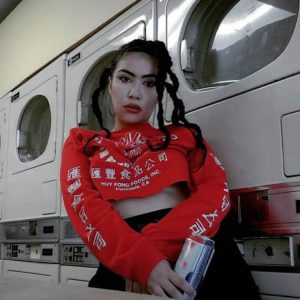After winning the SOCAN Foundation Indigenous Songwriter of the Year Award at the Indigenous Music Awards in 2019, Anachnid released her debut album, Dreamweaver, in February of 2020. She’s at the very beginning of her musical journey, which started in the summer of 2018 – thanks to a handful of songs online – but that journey will be on hiatus during the current health crisis. “I was supposed to attend a SOCAN Song Camp…” says the musician with resignation.
 Luckily, self-isolation doesn’t worry Kiki Harper, safe in her apartment in Montréal’s Latin Quarter. “Being in isolation, like everyone else right now, is quite easy for me,” she says. “When I recorded my album, I didn’t move two-and-a-half months!” That’s because of stupid accident that happened in Finland: wanting to hurry and catch up with a friend, she slipped on the edge of a sidewalk and broke her ankle in three places. “I actually had to learn to crawl before I could re-learn to walk,” she explains with a giggle. “You should never hurry for anyone.”
Luckily, self-isolation doesn’t worry Kiki Harper, safe in her apartment in Montréal’s Latin Quarter. “Being in isolation, like everyone else right now, is quite easy for me,” she says. “When I recorded my album, I didn’t move two-and-a-half months!” That’s because of stupid accident that happened in Finland: wanting to hurry and catch up with a friend, she slipped on the edge of a sidewalk and broke her ankle in three places. “I actually had to learn to crawl before I could re-learn to walk,” she explains with a giggle. “You should never hurry for anyone.”
The accident left its mark on Dreamweaver, an album built around introspective songs, with subdued synthetic hues, where Anachnid’s voice is sometimes menacing, sometimes hushed and hyper-sensitive. This stems from the feminine and masculine energies brewing inside the artist since those fractures. “The climax of all that comes on the song ‘Anachnid,’ right in the middle of the album,” she says, about the song that references her many weeks of immobility.
Harper claims her “urban Indigenous” identity through singing and rapping over house music, break-beats, dance-pop, and trap, a well-defined musical universe, despite very eclectic rhythms. “Working with just two composer-producers [Ashlan Phoenix Grey and Emmanuel Alias] allowed me to produce something cohesive… The release of my first album has spurred me on to do even more. This album allowed me to prove that I’m able to do several styles of music while remaining true to my spirit.”
Her musical approach is in the image of her album: modern and spontaneous. “I write my lyrics on the spot, in the studio, by digging into my emotions,” she says. “I’ll have an idea of the sound I want, and this gives me ideas for the lyrics; if I feel like dancing, I’ll imagine a house beat, and then I hear notes. I call it ‘downloading’ a song, from my head to a piece of paper, live in the studio. Then we create our samples and integrate them in the tracks,” says the musician, who’s taking advantage of self-isolation to learn to write on her own, via her computer.
Music has been part of her life since childhood, as are stone-carving and painting, passions she inherited from her mother, an artist and entrepreneur. “As for my dad, he has a natural talent for playing guitar,” says Anachnid, of Ojib-Cree Nation heritage, who sings about identity, cultural differences, integration (listen to the powerful “Windigo” and “America”) and ostracism (“Braids”).
“I’ve been writing songs since my childhood; my mother used to push me to enroll in arts camps where they made films and I wrote the music,” says Anachnid. “I’ve been playing music for a long time, but I’m quite introverted. Singing in front of an audience was a challenge for me. I had a hard time making my voice heard and communicating with people; now, I increasingly understand what I do and why I’m here.”
“I learned to sing with wolves,” she says, referring to her tight bond with her godfather and godmother, with whom she “grew up in the woods. They would watch over me when my mom would go to work; they’re the ones who taught me that if you answer back to a wolf who cries in the forest, he’ll answer back to evaluate how far away you are. If you cry and it answers back, you know it will not come closer than two kilometers from you to respect your hunting ground. It’s the music of nature.”